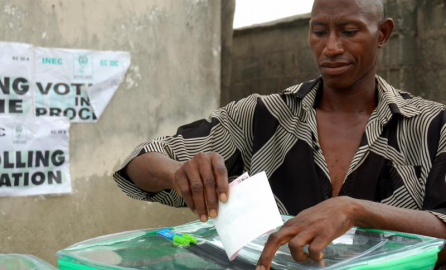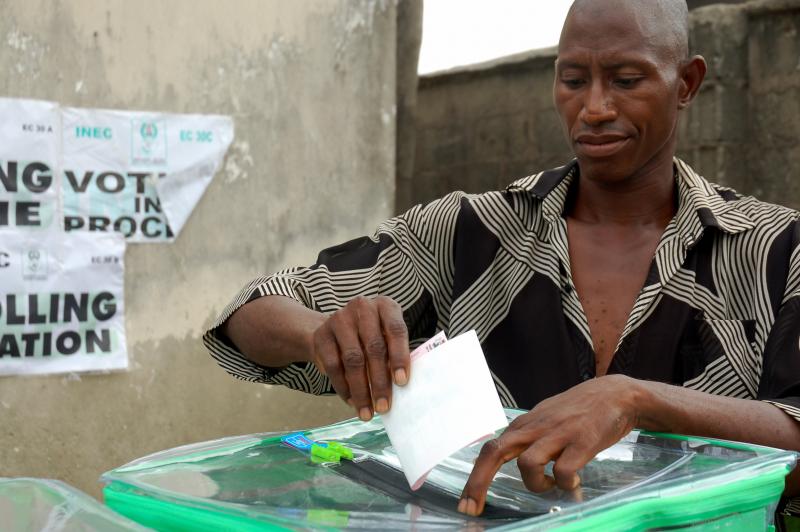In Africa, many recent polls have been marred by mismanagement and even violence. Electoral experts at a recent Brussels event said there are many valuable lessons to be learned from such polls to improve electoral support, which these days is a central part of donor programming.
Elections in many developing countries, and particularly in Africa, not only cause political disruption, but can lead to social disorder as the prospect of a change in occupancy at the presidential palace leads to bloodshed on the streets.
Multi-party elections are a relatively new development, with most of Africa only embracing the Western-model of democracy in the 1990s and presidential elections in particular remain a flash-point for violence.
“Most African countries, if not all, have extremely centralised power systems. Everything goes back to the president,” said Michel Paternotre an independent electoral expert. “And in this context, it’s really winner takes all.”
With everything to fight for, presidential elections in Kenya at Christmas-time 2007, in Guinea in 2009 and most recently in West Africa’s beleaguered Cote d’Ivoire at the end of last year, have all triggered violent protest and even mass killings and bloody confrontation.
These events, and many other related issues, were discussed in depth at a recent joint European Commission/ United Nations Development Programme workshop on Formulating and Implementing Electoral Assistance Projects in February 2011. The objective of the workshop was to strengthen the knowledge of relevant EC/UNDP staff and electoral management bodies on formulating and implementing electoral assistance projects within the context of the EU-UNDP Partnership on Electoral Assistance.
Elections do not make a Democracy
While the staging of elections are a central part of the democratic process, elections on their own do not make a country ‘democratic’.
“It is totally wrong to expect that elections lead automatically to democracy, and that democratic governance comes from elections,” said Niall McCann, independent elections expert. “Elections are one step along the way to a democratic governance agenda being pursued by a government.”
Nigeria is preparing for presidential elections in April yet West Africa’s economic power-house, an independent nation since 1960, has yet to hold a credible presidential poll and see the results accepted by the country’s political elites.
In a bid to strengthen democratic principles donors are increasingly supporting wider governance concerns like reinforcement of parliaments and human rights issues as part of their programming.
“I do believe the UN and EU are recognising that there needs to be other support beyond elections, support to parliaments for example,” said McCann. “It really doesn’t make much sense to spend a huge amount of money towards elections for a parliament that then underperforms and doesn’t act in the interests of its citizens.”
Political Will Fundamental
While wider governance support is essential, elections are still seen as a way of drawing a line under a period of political inertia and even conflict. But there needs to be a commitment and political will from all parties to accept the result of the polls if they are to offer any such solution.
Recent presidential elections in Cote d’Ivoire, a country cleaved in two by an inconclusive civil war that erupted almost a decade ago, were billed as an opportunity to stitch together peace. But despite substantial international support and funding for the polls, the elections left the country with two ‘victors’- each claiming the presidency for himself.
Electoral expert Mr Paternotre, who recently returned from Cote d’Ivoire, remains committed to the value of elections, even in complex situations like that of Cote d’Ivoire.
“Even though the situation is blocked, in a way it’s clear,” said Mr Paternotre. “It’s maybe the first time that we have a situation that at least publically there is a total unanimity about the result of the elections.”
International and African organisations widely accepted Alassane Ouattara as the election winner, beating incumbent Laurent Gbagbo who refused to accept the result and vacate the presidential palace.
“The crisis started with an election, so in a way it was logical that the only way to get out of the crisis was through an election,” said Mr Paternotre. “The fact is that one of those who signed up to elections was not genuinely committed.”
To hear more from Mr Paternotre, click on the icon below:
The Electoral Cycle
Effective electoral support requires donors taking the long-view. In a bid to address the stop-start programming previously associated with electoral support , the EC and UNDP have developed and adopted the electoral cycle approach to electoral assistance projects.
The electoral cycle requires that donors think within a ten-year framework of democratic governance with interventions needed in the pre- and post-election period as well traditional interventions like vote monitoring, which take place during the election process itself. To read more about this approach, click here.
At the joint EC/ UNDP event, Domenico Tuccinardi, Director of the Network for Enhanced Electoral and Democratic Support, or NEEDS project, gave a presentation on the trends and challenges facing the Electoral Cycle Approach.
Taking a long-view and using past experience to inform future decisions is essential in supporting electoral processes. Mr McCann recently returned from Sudan where the residents of the southern third of the country late last year voted to secede from the Khartoum-based government of the north. Though such referendums are markedly different from power-changing polls, they can be useful in informing future election support planning.
“Noting how local electoral bodies organise the process, you can anticipate how the first multi-party elections that will take place - once Southern Sudan becomes an independent country in July – you can anticipate some of the issues that will arise,” said Mr McCann. To hear more from Mr McCann, click on the icon below:
Key issues in Southern Sudan are likely to include whether voters are under any pressure to register or vote and how results are processed and their announcement managed, according to Mr McCann.
“The big thing to always keep in mind when it comes to international support to elections is that elections are political events and the support that the United Nations and European Union provide is technical support,” said Mr McCann. “So we’re often providing technical support for political problems and that does not always fit well together.”
“We expect our technical support will solve political problems, when in fact it is politics that solves political problems.”



Log in with your EU Login account to post or comment on the platform.